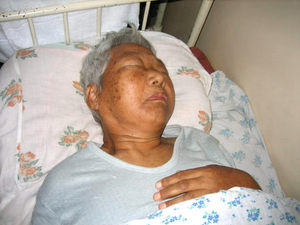 |
|
Park Suk-ja, who is hospitalized in Sakhalin.
|
Koreans sent to Russia find return to South Korea a mixed blessing
When South Korea opened its doors to them, many had to leave their families behind in order to return to their homeland. Ethnic Koreans living in the Sakhalin region of Russia born before August 15, 1945, or liberation day, are now being allowed to become residents of South Korea. Yun In-sun, 79, who lives in Yuzhno-Sakhalinsk, Sakhalin Province, was one of those that returned to Korea under this program. But she is now back in Russia, unable to endure separation from her family; since returning, however, she longs to see her native land again. Yun said sadly, "Korea is perfectly good, but I couldn’t live there because I missed my sons and daughters too much." "It’s so sad to see mother sitting in a chair dejectedly all day long. She can’t take a walk due to her old age and just repeatedly says, ’I want to be buried in my hometown,’ " said Go Haeng-ja, 59, Yun’s eldest daughter. Yun was born in Gyeongju, North Gyeongsang Province and grew up there before being sent to Japan with her husband in the early 1940s. She was then forced to work in a mine in Sakhalin. After liberation, her husband worked in construction and Yun worked at a farming organization. Her husband passed away in 1994. After living in foreign lands for over 60 years, Yun was given the opportunity to come back to Korea. However, her five children and her grandchildren had to stay in Sakhalin. In May 2004, after four years in South Korea, Yun decided to leave for Russia again.Park Suk-ja, 80, who is hospitalized in Yuzno-Sakhalinsk, had a similar experience. Park came back to Sakhalin in July 2005, five years after returning to South Korea. The old woman could not endure the solitude of living alone in South Korea. She recently collapsed from heart trouble, and is now bedridden, gradually losing consciousness. Her daughter, Park Haeng-ja, visits her daily. "It breaks my heart to think that my mother will die in a foreign land after suffering hardship in a foreign country all her life," she said. A total of 1,662 first-generation Koreans in Sakhalin have returned permanently to their homeland since 2000. Among them, six have returned to Sakhalin. Korean residents in Sakhalin, however, said that nearly 30 others have permanently returned to Russia without giving official notice. Kim Woe-cheol, chairman of an organization which supports Korean residents in Sakhalin, said, "How can those 70 to 80 years old live alone in Korea? Under the current system, it’s better for them not to go there." As a lawmaker of the ruling Uri Party last year, Prime Minister Han Myung-sook suggested a special bill for the permanent homecoming of Korean residents in Sakhalin to the National Assembly. Nine months later, on September 7, this bill was presented to the Assembly’s Unification, Foreign Affairs & Trade Committee. According to the bill, family members of those first-generation Koreans in Sakhalin would also be allowed to come to South Korea. The bill has yet to pass through the National Assembly.





